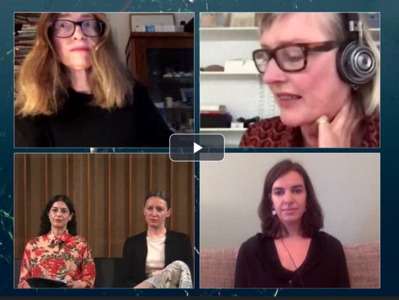Curating and/as Care
Reckitt, Helena. 2020. 'Curating and/as Care'. In: New Alphabet School #4 Caring. Haus der Kulturen der Welt, Berlin, Germany 12 June 2020. [Conference or Workshop Item]
![[img]](https://research.gold.ac.uk/29594/1.hassmallThumbnailVersion/%234%20Caring_Sascia%20Bailer%2C%20Gilly%20Karjesvky%2C%20Rosario%20Talevi%2C%20Olga%20von%20Schubert%2C%20Helena%20Reckitt%2C%20Elke%20Krasny_Jun%2012%2C%202020%20.png)
|
Image
#4 Caring_Sascia Bailer, Gilly Karjesvky, Rosario Talevi, Olga von Schubert, Helena Reckitt, Elke Krasny_Jun 12, 2020 .png Available under License Creative Commons Attribution Non-commercial. Download (1MB) | Preview |
Abstract or Description
This keynote talk addressed the faultlines inherent to discussions about curating and care, in a contemporary art field in which conditions of precarity and exhaustion effectively undermine principals of self and collective care.
While the politics of care, vulnerability and co-dependency have become increasingly visible as thematic strands in arts programmes, curators and cultural workers often struggle to incorporate the radical implications of such artistic practices beyond the level of presentation, as they grapple with rigid institutional dynamics and protocols and neoliberal labour conditions. In identifying new tools for collective and self-care, communities that have historically suffered a deficit of institutional care are those that have the most to teach – an argument underlying a new book, HEALTH (Whitechapel & MIT Press), edited by Barbara Rodríguez Muñoz, drawn from the worlds of art and activism, and foregrounds insights from the Social Theory of Disability.
Highlighting recent curatorial projects that take a durational, interdisciplinary approach to processes of research, development, and consultation, Reckitt showed how they aim to establish frameworks for collective learning and exchange. Rejecting the domineering model of curator as author, the initiators of such projects locate themselves as mediators working within a relational network. This more collaborative approach to curatorial practice foregrounds vulnerability, co-dependence, resisting the performance of professionalism that works to the detriment of arts workers’ and their collaborators’ wellbeing. Practitioners in such projects recognise what they do as feminised forms of affective labour and social reproduction, and value them as such. They aim to replace old habits of knowledge and attention with new ones, grounded in long-term commitments, that are attuned to the values of caring with identified by feminist political scientists, Berenice Fisher and Joan Tronto.
|
Item Type: |
Conference or Workshop Item (Talk) |
||||||
| Additional Information: |
The talk took part of the opening day of New Alphabet School #4 Caring which explored, mapped, complicated and challenged notions of caring, considered as a range of practices and an ethics of being together otherwise. It looked at how caring has recently received increased attention in critical cultural discourses, allowing for new research projects, exhibitions, and publications to emerge, and asked why this attention was shifting now? This opening conversation between the two curators and authors Elke Krasny and Helena Reckitt traces the history of care and social reproduction from a feminist and critical cultural perspective and situates it in today´s discourse on caring. By highlighting relevant practices on caring they question, complicate, and reflect on caring as a radical practice towards social transformation. Reckitt presented her keynote following that of curator and author Elke Krasny, which introduced theoretical approaches to care within intersectional feminism. The session introduced the audience to the history of the concept of care and contemporary discourses around caring, setting the ground for the contributions of the following days. Following Reckitt and Krasny's talks the speakers engaged in a conversation with one another, the curators Sascia Bailer, Gilly Karjesvky, Rosario Talevi, and Olga von Schubert, and members of the audience via live chat. |
||||||
| Keywords: |
curating, care, social reproduction |
||||||
| Related URLs: |
|
||||||
| Departments, Centres and Research Units: |
|||||||
| Dates: |
|
||||||
| Event Location: |
Haus der Kulturen der Welt, Berlin, Germany |
||||||
| Date range: |
12 June 2020 |
||||||
| Item ID: |
29594 |
||||||
| Date Deposited: |
04 Jan 2021 10:27 |
||||||
| Last Modified: |
04 Jan 2021 10:27 |
||||||
|
URI: |
View statistics for this item...
 |
Edit Record (login required) |

 Tools
Tools Tools
Tools
